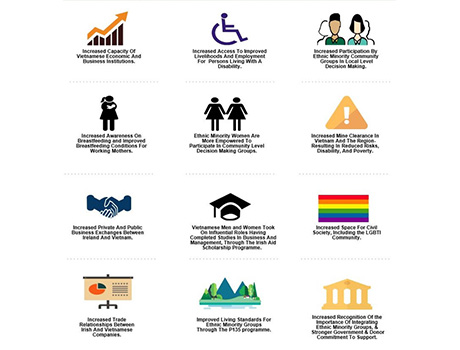Vietnam Country Strategy Programme 2011-2015 Evaluation Report
8/2/18
Vietnam Country Strategy Programme 2011-2015 Evaluation Report
Evaluation of Ireland’s Vietnam Country Programme
The evaluation of Ireland’s 2011-2015 country strategy programme in Vietnam and the sub region (Cambodia, Laos and Myanmar) provided an independent assessment of the overall performance of the programme, providing accountability for the funds expended during the period and identifying learning to inform policy and programming for Ireland’s role in an emerging middle income country.
Vietnam Country Programme 2011-2015
Vietnam having transitioned into lower middle income country status faced the challenge of sustaining progress and ensuring that economic growth is more inclusive and resilient to shocks. Ireland supported the Government of Vietnam to maintain continued growth which benefits all and reaches the most vulnerable and marginalised groups. Ireland’s programme did this through two themes:
Inclusion: to reach people who have not benefitted from Vietnam’s development to date. Ireland focused on the most marginalised, in particular ethnic minorities, the disabled and LGBTI populations, through supporting the Government of Vietnam’s Programme on Ethnic Minority Poverty and support to civil society.
Innovation: generating ideas and experience to contribute to Vietnam’s reform and modernization agenda and in support of national poverty programmes. This includes the Vietnam-Ireland Exchange programme to build economic management capacity, build institutional links with Irish institutions, and provide Irish university fellowships for Vietnamese women and men.
Evaluation Main Findings
- The programme has clearly added value and been cost-effective in the delivery of results. With an annual budget of €12 million, the CSP has leveraged more-than-expected results, and considerable influence.
- The CSP was strongly relevant in its design and continued to be so during the implementation period. It was founded on rigorous analyses of context, modalities, results and outcomes and coherence and linkages were clear and well-articulated throughout the CSP. There was, however, room for it to be less detailed in design to allow more flexibility in implementation.
- The evidence reviewed consistently supports that the CSP has been very effective, meeting many of its targets, and performing well beyond what was planned in a number of areas.
- The CSP clearly identified gender as a priority, in particular the linkages between poverty and gender. While the CSP has resulted in some positive gender outcomes, results have not been consistently captured and there is some room to further advance the gender equality agenda.
- There have been unanticipated results and outcomes which have contributed to the CSP being more than the sum of its parts, including the establishment of new initiatives such as the Vietnam Ireland Bilateral Education Exchange and influencing other donors’ priority setting (e.g. leveraging additional donor funding for the P135 programme for ethnic minorities).
- The CSP choice of modalities and partners has generally been very effective, building on prior experience working across a range of partners, bringing together local and national level work, and enhancing this with engagement in regional activities.
- The Ireland Development and Experience Sharing Programme (IDEAS) has been of significant value, leading to partnerships between Irish and Vietnamese institutions, building Vietnam government policy capacity and playing a key role in high level access to the Vietnamese Government.
- The Scholarship/Fellowship programme has contributed towards increasing Ireland’s profile as a key destination for higher level education.
- The regional engagement in Laos, Cambodia and Myanmar has added value in terms of exposure, experience and working across different areas of engagement (political and development agendas).
- The evaluation identified key characteristics of Irish support that have contributed to the success of Ireland’s influence in Vietnam: flexibility of approach; a focus on areas of Irish added value; linking experience from local to national levels as an input into dialogue; working through a mix of modalities and partnerships; working across aid, trade and political agendas (the whole of Embassy approach); as well as consistent messaging and a clear identification of priority agendas, especially regarding ethnic minority poverty and including with respect to Ireland and Irish values.
- The CSP has developed strong synergies between the areas of work of the embassy. The embassy in Vietnam has been an early adopter of the whole of embassy approach, with results and outcomes that have been beneficial to both the aid programme and to emerging trade relations with Vietnam.
Download: Vietnam Country Strategy Programme 2011-2015 Evaluation Report (PDF)


